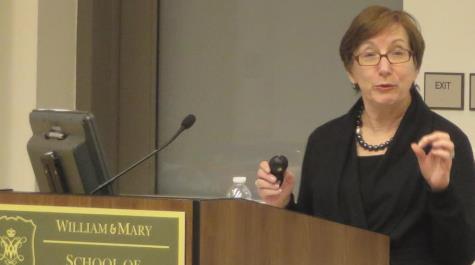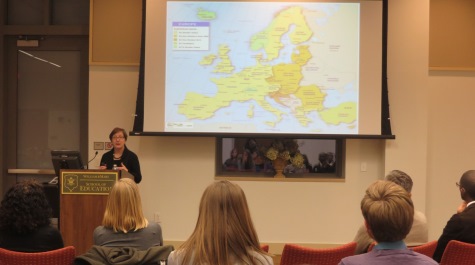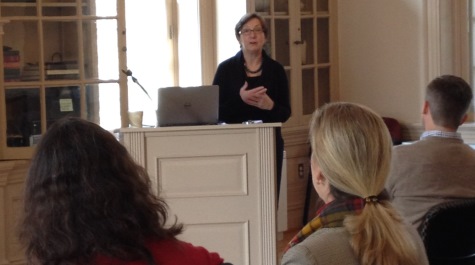Pursuing Quality in Higher Education
The William & Mary School of Education’s higher education program hosted visiting scholar Professor Ellen Hazelkorn in November, 2014. During her visit Professor Hazelkorn presented a teaching workshop for the William & Mary community, as well as a higher education salon. She also attended the William & Mary Women’s Network Forum, and joined the higher education faculty and students at the annual Association for the Study of Higher Education (ASHE) conference in Washington, D.C. At ASHE, Dr. Hazelkorn served as the discussant for a symposium on international partnerships that included research by William & Mary faculty.
 Dr. Hazelkorn holds a joint appointment as Director, Higher Education Policy Research Unit (HEPRU), DIT (Ireland), and Policy Advisor to the Higher Education Authority (HEA). She is also President of EAIR (European Higher Education Society) and Chairperson of the EU Expert Group on Science Education (2014). Professor Hazelkorn has over 20 years senior experience in higher education, previously holding positions as Vice President of Research and Enterprise, and Dean of the Graduate Research School, (2008-2014), and Vice President and Founding Dean of the Faculty of Applied Arts, Dublin Institute of Technology (1995-2008). Professor Hazelkorn works as a consultant/specialist with international organizations and universities, is/was a member government/international review teams and editorial boards. She was awarded a BA and PhD from the University of Wisconsin, Madison, and the University of Kent, UK, respectively.
Dr. Hazelkorn holds a joint appointment as Director, Higher Education Policy Research Unit (HEPRU), DIT (Ireland), and Policy Advisor to the Higher Education Authority (HEA). She is also President of EAIR (European Higher Education Society) and Chairperson of the EU Expert Group on Science Education (2014). Professor Hazelkorn has over 20 years senior experience in higher education, previously holding positions as Vice President of Research and Enterprise, and Dean of the Graduate Research School, (2008-2014), and Vice President and Founding Dean of the Faculty of Applied Arts, Dublin Institute of Technology (1995-2008). Professor Hazelkorn works as a consultant/specialist with international organizations and universities, is/was a member government/international review teams and editorial boards. She was awarded a BA and PhD from the University of Wisconsin, Madison, and the University of Kent, UK, respectively.
Professor Hazelkorn conducted a teaching workshop at Blow Hall titled “Pursuing Quality in Higher Education.” The session reviewed how institutions and faculty can develop and implement strategies to support teaching and learning. A problem in higher education today is providing high quality, effective teaching and learning to a more diverse group of students, and to do this in an environment of funding cuts. How is quality defined? How is quality measured? Dr. Hazelkorn reviewed the influence of globalization of knowledge on the notion of quality, as stakeholders want to be assured they are receiving value and societies want learners to be prepared for the world of work. Yet, there is no agreement on the definition of quality in higher education, as context dictates priorities and definitions.
The teaching session emphasized the role of the “total” student experience, which occurs both inside and outside the classroom as student engagement aligns with educational practices. Because employers now require more of their new hires than in the past (because of more complex work situations, higher levels of learning and knowledge and broader skill sets are required on the job), institutions of higher education must adjust programs to include more student experience with practical knowledge and authentic learning opportunities, such as group assignments, participation in research projects, internships, work placements, problem-based learning, and oral presentation. Dr. Hazelkorn discussed how the Bologna Process addressees the accountability loop with its focus on competencies and student outcomes. Finally, the session reviewed a series of eight quality instruments. In using these measures of quality, institutions must develop and implement a strategy for support and on-going improvement of quality in teaching and learning, in such a way that it is on parity with research. Ultimately, institutions must support teaching staff and students to create effective teaching practices and quality.
Professor Hazelkorn’s higher education salon presentation at the School of Education explored The Role of Policy in Internationalization. Professor Hazelkorn’s presentation focused on the examination of the underlying policy assumptions regarding processes of internationalization, higher education reform, and institutional mission diversity; the implementation effects of policy on teaching and learning – lessons from Bologna; and the evaluation of reform efforts using assessment data – discussion of trends in Europe regarding quality assessment and higher education performance. Professor Hazelkorn began with an overview of European policy on higher education and research. She described some of the policy initiatives such as the European Project at the end of World War II, the Bologna Process, the Lisbon Strategy, and Europe 2020. She explained that the European Union has no authority over higher education. She enumerated and described several drivers behind European policy on higher education including harmonization vs. homogenization, globalization, competitiveness, and quality and excellence. The presentation ended with a question and answer session. Students, alumni, and faculty from across campus as well as several School of Education programs attended this salon session.
Professor Hazelkorn’s visit was co-sponsored by the School of Education Office of the Dean, the Higher Education Program in the department of Educational Policy, Planning and Leadership, the Charles Center, the Reves Center for International Studies and the Thomas Jefferson Public Policy program.


